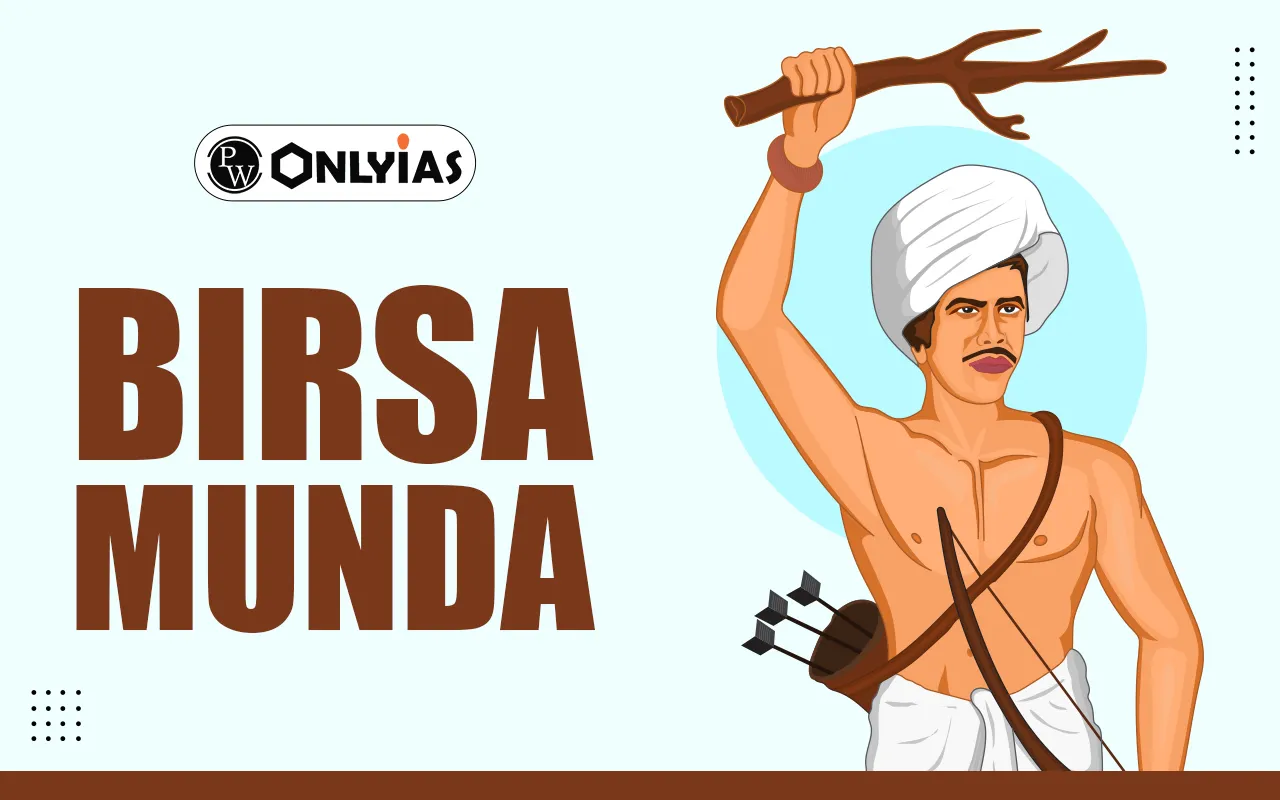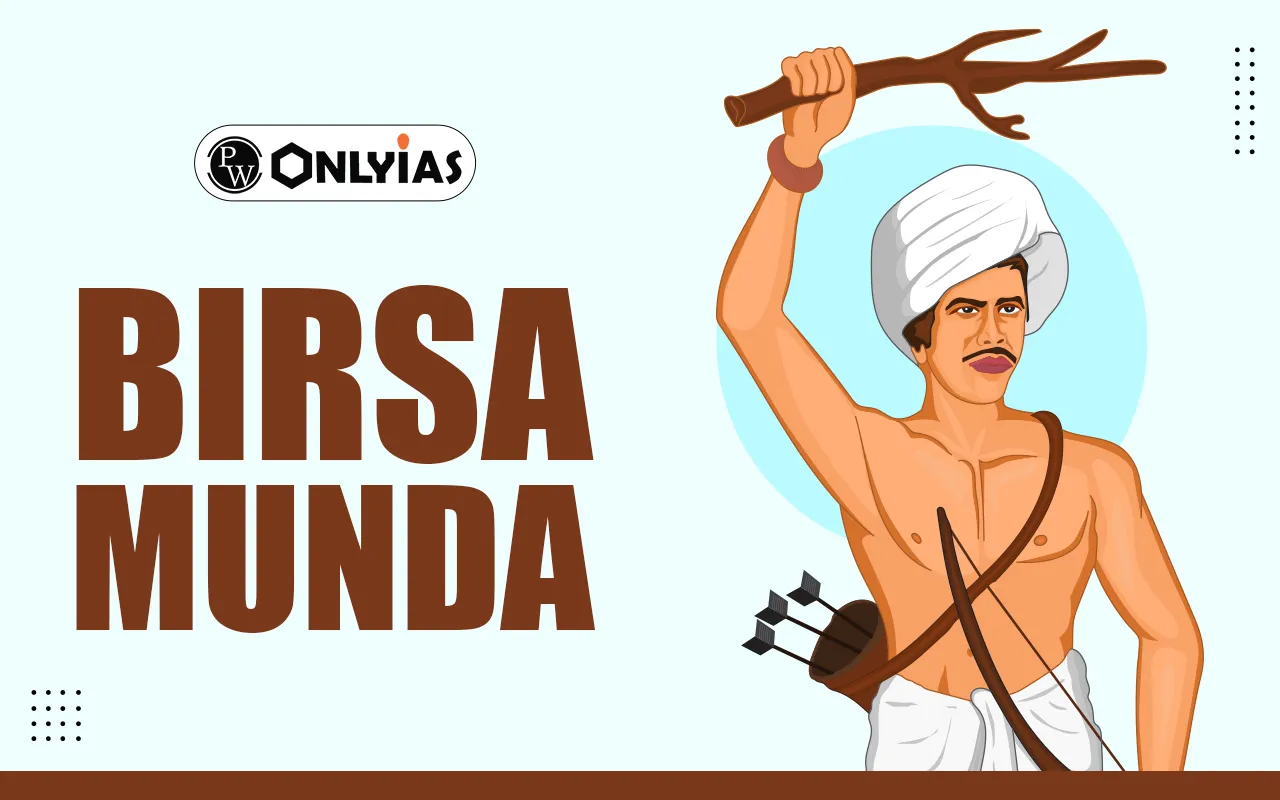

Birsa Munda was a tribal leader and freedom fighter. He worked to protect his community from British oppression. He also inspired tribal people to stand for their rights. He played an important role in the Munda Rebellion. He promoted tribal culture and traditions. His life is remembered for bravery, leadership, and dedication to justice. Learning about him helps students understand tribal history and struggles.
Birsa Munda Biography Overview
Birsa Munda, known as the “Father of the Earth” among his followers, led the Munda Rebellion. He worked to defend tribal lands and rights. Born in Ulihatu, Ranchi, he became a symbol of resistance. His leadership united tribal communities against the British. He was also a religious leader who started the Birsait faith.
|
Birsa Munda Biography Details |
|
|---|---|
|
Aspect |
Details |
|
Birth Date |
November 15, 1875 |
|
Birth Place |
Ulihatu, then in Ranchi district, Bengal Presidency (now in Khunti district, Jharkhand) |
|
Death Date |
June 9, 1900 |
|
Age at Death |
24 years |
|
Movement |
Munda Rebellion (Ulgulan) |
|
Legacy |
Tribal freedom fighter and religious leader |
Birsa Munda Early Life
Birsa Munda was born in a small village in Jharkhand. From a young age, he saw the struggles of tribal communities. He studied under his teacher Jaipal Nag in Salga and then joined a German Mission School. He left the school because it focused on converting children to Christianity. Later, he returned to his tribal roots and developed his own faith, Birsait.
-
Born in Ulihatu, Jharkhand, into a Munda tribal family.
-
Experienced the daily struggles of tribal communities under British rule.
-
Studied in Salga under teacher Jaipal Nag.
-
Joined a German Mission School but later left due to conversion practices.
-
Returned to traditional tribal beliefs and founded Birsait.
-
Developed leadership and a strong sense of justice from a young age.
-
Observed the exploitation of tribal lands and the unfair treatment of his people.
-
His early experiences shaped his later fight for freedom and tribal rights.
Birsa Munda Role in the Freedom Struggle
Birsa Munda led the Munda Rebellion, also called Ulgulan, to resist British rule. The rebellion aimed to end the oppression of tribal communities. He encouraged tribal people to fight for their rights and establish self-rule. His slogans inspired unity and pride among the Mundas. He also influenced the British people to pass the Chotanagpur Tenancy Act.
Here are some points to highlight the role of Birsa Munda in the freedom struggle of India:
-
He led the Munda Rebellion (Ulgulan) against British rule.
-
He encouraged tribal people to resist unfair treatment by landlords.
-
He promoted self-rule and unity among tribal communities.
-
Birsa Munda preserved tribal culture and traditions during the fight.
-
He challenged British authority using guerrilla tactics.
-
He inspired pride and confidence in tribal people.
-
He highlighted the need for tribal land protection in India.
-
He influenced the enactment of the Chotanagpur Tenancy Act to protect tribal land and recognise khuntkatti rights.
Chotanagpur Tenancy Act
The Chotanagpur Tenancy Act of 1908 was passed after the Munda Rebellion. It protected tribal land from being taken by outsiders. The Act recognised the Khuntkatti system, where tribal families had collective ownership of land. Though helpful, the law was hard to enforce and did not solve all problems.
UPSC aspirants can note down the following points about the Chotanagpur Tenancy Act:
-
The Chotanagpur Tenancy Act was passed in 1908 after the Munda Rebellion.
-
It protected tribal lands from non-tribal settlers.
-
It helped in the recognition of the traditional Khuntkatti system of land ownership.
-
It was aimed at preventing the exploitation of tribal communities.
-
Implementation of the Chotanagpur Tenancy Act faced challenges due to administrative issues.
-
It did not fully solve the social and economic problems of tribes.
-
Further, it highlighted the need for further land reforms.
-
It provided a legal framework for tribal land protection.
Birsa Munda Birsait
Birsait was a faith created by Birsa Munda. It promoted worship of one god and tribal traditions. The faith opposed forced conversion of the religion of people to Christianity. Further, Birsait united tribal communities and strengthened their identity. It encouraged social reforms and cultural pride among the Mundas and Oraons. Birsait helped preserve tribal culture and united communities against outside influence.
Here are a few details about Birsa Munda Birsait faith:
-
It was founded by Birsa Munda to preserve tribal beliefs.
-
This faith promoted monotheism and worship of one god while resisting missionary conversions.
-
It resisted forced conversion by missionaries.
-
It strengthened tribal unity among Mundas and Oraons.
-
This faith encouraged tribal communities to follow traditional customs.
-
It promoted social and cultural reforms.
-
It built a sense of identity and pride.
-
It supported the broader freedom struggle indirectly.
Birsa Munda Death
Birsa Munda died on June 9, 1900, while in British custody. The British cited cholera as the cause, though many have questioned the circumstances of his death. He was only 24 years old when he passed away. His death was a great loss for tribal communities. Even after his death, his followers continued to fight for their rights. Today, he is remembered as a martyr and a symbol of resistance.
| Related Post | ||
| UPSC IFS Mains | Youngest IFS Officer | UPSC IFS Salary |
| IAS vs IFS | UPSC IFS Eligibility Criteria | UPSC IFS Preparation Strategy |
